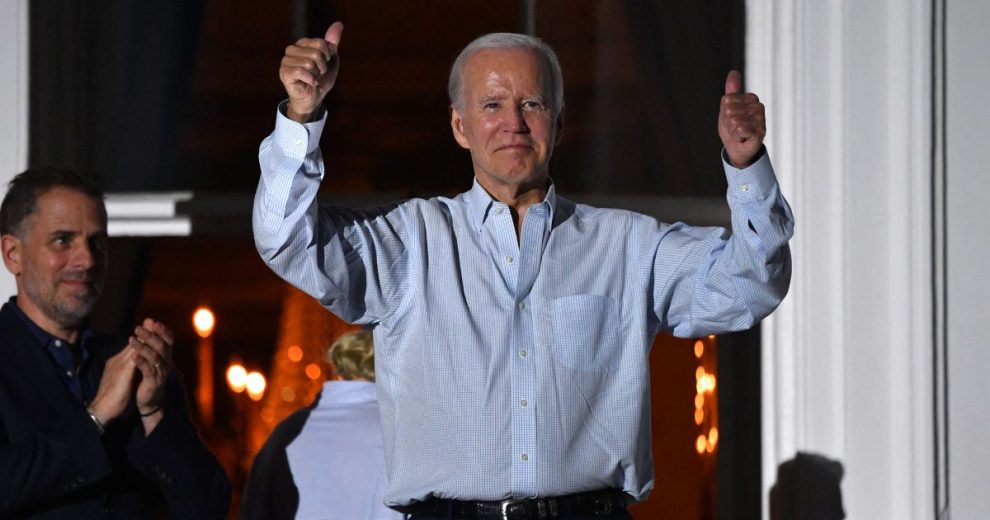Vladimir Putin’s Russia has further tightened the flow of gas being fed to the European Union as the cold northern European winter looms mere months away.
The flow through the Nord Stream 1 pipeline to Germany has been cut to just 20 percent of normal as of Tuesday.
The White House is reportedly attempting to work with European allies to prevent them from easing the economic pressure on Moscow as panic over a potentially catastrophic energy shortage is beginning to set in, according to an unnamed Biden administration source cited by CNN. The outlet quoted the official who said that such an aggressive cutoff of gas from Russia “was our biggest fear” and a move that has placed the western world into “unchartered territory.”
However, it is worth noting that the cutoff itself was allegedly presaged by a letter from the Russian State gas monopoly Gazprom as early as July 18 that pointed to force majeur causing them to reduce delivery to the NATO nations yet again.
According to The New York Post, “Gazprom deputy CEO Vitaly Markelov said the company has still not received a Siemens turbine used at Nord Stream 1’s Portovaya compressor station that has been undergoing servicing in Canada.
“Markelov said there were sanctions risks associated with the machinery, while Siemens Energy said Gazprom needed to provide customs documents to bring the turbine back to Russia.”
Reuters reported that the turbine had been shipped from Canada to Germany as of July 17 when the repair work was completed. The Nord Stream 1 pipeline is in the midst of annual maintenance, which had previously caused the flow of gas to cease entirely.
JUST IN – Russia's Gazprom halts another gas turbine in Nord Stream 1 pipeline to Germany. Natural gas flows to drop from July 27. pic.twitter.com/E5gGAAjrja
— Disclose.tv (@disclosetv) July 25, 2022
Reuters wrote, “Gazprom said supplies through the Nord Stream 1 pipeline to Germany would drop to just 20 percent of capacity.
“Gazprom said flows would fall to 33 million cubic metres per day from 04:00 GMT on Wednesday — a halving of the current, already reduced level — because it needed to halt the operation of a Siemens gas turbine at a compressor station on instructions from an industry watchdog.”
Moscow, naturally, has pegged the blame for the Gazprom service reductions on the sanctions that are currently levied against Russia following their illegal invasion of neighboring Ukraine.
Conversely, the Post reported that EU leadership in Brussels have made the assertion that Putin and his regime are leveraging Gazprom to blackmail the European countries and retaliate against them for the financial and material support they’ve provided to the Ukrainians.
European Commissioner for Energy Kadri Simson said, “There is no technical reason to do so. This is a politically motivated step, and we have to be ready for that,” Reuters reported.
The EU has since adopted emergency measures to cut back fuel usage. “And exactly for that reason, the pre-emptive reduction of our gas demand is a wise strategy,” she concluded.
The energy ministers from all but one of the 27 Member States supported a voluntary 15 percent reduction in their consumption over the winter that could become mandatory if Gazprom shuts down service entirely, according to The Guardian. Hungary, which is more dependent on Russia for oil, as well as gas, refused.
“This is an unjustifiable, useless, unenforceable and harmful proposal,” Hungary’s Foreign Minister Peter Szijjarto told the AFP.
A cryptic warning from Russian President Vladimir Putin in mid-July that the “[s]anctions restrictions on Russia cause much more damage to those countries that impose them” could now read less as a warning and more as a threat.
Putin continued, “Further use of sanctions may lead to even more severe — without exaggeration, even catastrophic — consequences on the global energy market.”
“We know that the Europeans are trying to replace Russian energy resources,” Putin said.
“However, we expect the result of such actions to be an increase in gas prices on the spot market and an increase in the cost of energy resources for end consumers.”
Story cited here.
























